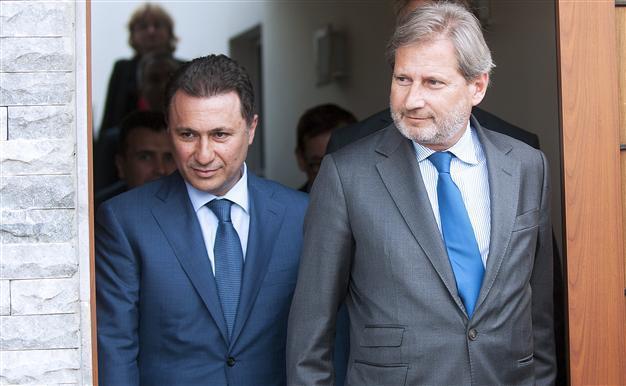Macedonian leaders fail to reach final deal to end crisis
BRUSSELS - Reuters

AFP Photo
Macedonian political leaders failed to reach a final agreement to resolve the country's political crisis in marathon talks in Brussels on June 10, the European Union said.
The EU brokered a deal on June 2 for early elections in Macedonia, potentially ending months of political turmoil triggered by damaging wiretap disclosures against the government, although few details of the deal were made public.
The political impasse over allegations of widespread government abuse of power had raised fears of instability in a country that flirted with civil war in 2001.
EU enlargement commissioner Johannes Hahn invited the leaders of Macedonia's four main political parties to Brussels on June 10 to try to hammer out the specifics of the agreement.
But around 12 hours of talks - in which the U.S. ambassador to Macedonia, Jess Baily, also participated - failed to reach a breakthrough.
"The talks were open and detailed, but did not lead to a final agreement yet," the EU said in a statement.
"The European Union urges all parties - in the interest of their country and its citizens - to find a lasting political compromise without any delay and come forward with concrete proposals to this end, building on the agreement already reached in Skopje on June 2," it said.
The EU said reform commitments agreed to on June 2 must be implemented urgently.
"This is essential for the country to make any progress on the Euro-Atlantic path," the EU said, referring to Macedonia's bids to join the EU and NATO which have been blocked for years by a dispute with neighbouring Greece over Macedonia's name.
The EU said it remained ready to mediate in any further talks.
After nine years in power, conservative Prime Minister Nikola Gruevski has been under pressure since January over wiretap disclosures released by opposition leader Zoran Zaev and which the West says have raised serious questions about democracy in the ex-Yugoslav republic.
Zaev says the wiretaps were collected illegally by the government, targeting 20,000 political figures, journalists and judges, foes and allies alike. They appear to expose tight government control over the media, courts and the conduct of elections.
The government says the tapes were made by a foreign spy service working with Zaev to bring down the government. Zaev has been charged with "violence" against the state.
On June 2, Hahn said the Macedonian political leaders had agreed to "a kind of transitional period" and early elections no later than the end of April 2016.
